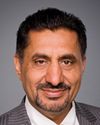Mr. Speaker, other countries know that budgets do not balance themselves. That is why observers from around the world, including Europe, Asia, and Africa, are studying our sound approach to eliminating the deficit. They admire that our Conservative government is not raising taxes or cutting support to important social programs to balance the budget. Instead, we have focused on reducing waste and ineffective government spending.
That is leadership, and it is why countries around the world are looking to our Prime Minister and our Minister of Finance for guidance.




















